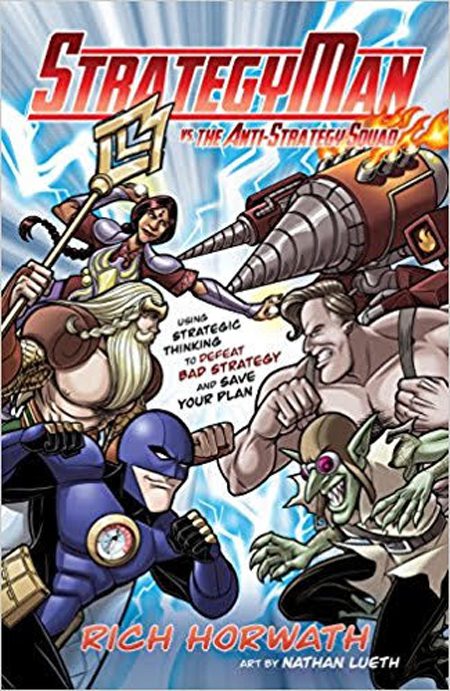
 The dictionary defines strategy as “a plan of action or policy designed to achieve a major or overall aim.” Author and business expert Rich Horwath would add one word to that: essential.
The dictionary defines strategy as “a plan of action or policy designed to achieve a major or overall aim.” Author and business expert Rich Horwath would add one word to that: essential.
Without strategy, a business of any size is likely to find itself in a tough or losing position against the competition, Horwath says. Small businesses are particularly at risk because they have unique challenges against larger firms or those with greater resources.
In his new book, Strategyman vs. the Anti-Strategy Squad, the bestselling author offers specific advice for overcoming the challenges that prevent leaders from strategically creating, implementing, and reaching their goals.
“As a small-business owner, it’s even more important than large businesses to be able to really focus your resources: your time, your talent and your budget on the critical strategies that will differentiate you in the market,” Horwath says. “Too often, small business people expand their clientele, customer base or expertise before they get a strong foothold in one area. You want to be the expert and work with your customers on a regular basis.”
As the CEO of the Strategic Thinking Institute, Horwath leads executive teams through the strategy process and has helped more than 100,000 managers around the world develop their strategic thinking skills. A former chief strategy officer and professor of strategy, he brings both real-world experience and practical expertise to help leaders build their team’s strategic capabilities.
Business owners also need to think about being innovative, which means they need to get ahead of new ideas. But that doesn’t necessarily mean just innovating products. It could be anything from how you answer the phone to what you sell, Horwath says.
“People think of innovation as a giant, monstrous topic and it can be, but for a small business owner the best way to think about it is creating new value for customers,” Horwath says. “It could be as simple as the experience in the store or online; type of service you provide; phone or email or in person. There are lots of different ways to create new value.”
Granted, a new product gets lots of attention. But so can other things like being the best in customer service, he notes.
 “Innovation isn’t just about a product,” Horwath adds. “There are 14 different types of innovation. Look at your everyday contacts, interactions with customers. Can you impart that idea to the rest of the people in the company? Now, you have a lot of people looking to be innovative and drive new value. That makes you unique to your customers; you are offering things they’re not seeing in other places and that is what gives repeat business.”
“Innovation isn’t just about a product,” Horwath adds. “There are 14 different types of innovation. Look at your everyday contacts, interactions with customers. Can you impart that idea to the rest of the people in the company? Now, you have a lot of people looking to be innovative and drive new value. That makes you unique to your customers; you are offering things they’re not seeing in other places and that is what gives repeat business.”
One more piece of advice Horwath believes in firmly: Business owners must be able to focus on strategy in a way that lets them say “no” to the wrong opportunities. This advice covers businesses of every size, he says, but small firms really need to follow this one.
“There are lots of things are coming at us in terms of opportunities,” Horwath says. “It’s ok to stop and say no to certain things that won’t drive value for our group or customers. You’ve got to be able to understand where something brings the most value and then create a strategy that acts as a filter.”
That strategy must be upheld, no matter what.
“It really acts as a filter: If it meets these criteria, then we will act on that opportunity. If not, doesn’t meet our strategy, then we won’t spend time, attention, budget on it. As a small business owner, it’s critical to create strategy that acts as that filter. You can’t be all things to all people.”








